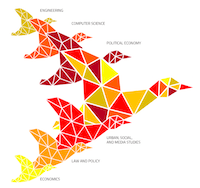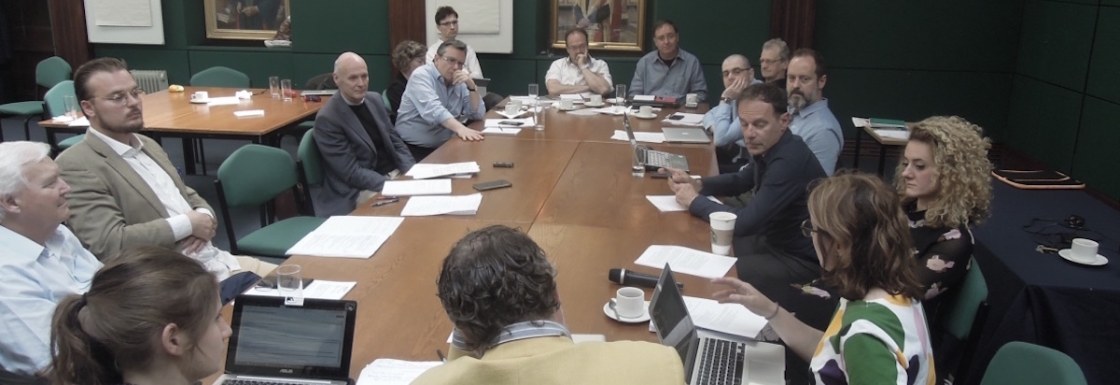Towards an Alternative Internet in the Age of Cambridge Analytica and Fake News.
Communication and Media Research Institute and Westminster Institute for Advanced Studies Hosted the Netcommons Policy Workshop

netCommons: Network Infrastructure as Commons (http://www.netcommons.eu) is an interdisciplinary EU Horizon 2020 project that studies how community-based networking and communication services can be shaped in order to offer a complement or alternative to the Internet’s current dominant model. The project involves six teams from the University of Trento in Italy, the Polytechnic University of Catalonia (UPC) in Spain, CNRS in France, the University of Westminster, the Athens University of Economics and Business in Greece, and Nethood in Switzerland.
Community networks (CNs) are computer networks that are controlled, owned and operated by communities as common resource. They often combine both a technological infrastructure and digital services. They challenge the prevalent Internet model that is dominated by commercial monopolies, surveillance, privacy violations, advertising, and fake news culture.
On May 15, the Communication and Media Research Institute and the Westminster Institute for Advanced Studies hosted a policy workshop that brought together a range of stakeholders for discussing what Internet is desirable; whether the digital commons pose viable models for the organisation of the Internet’s infrastructure, software, platforms and content; and what policies and measures are needed for strengthening the commons as alternatives to Internet monopolies, surveillance, privacy violations, and targeted ads.
Prof Christian Fuchs, leader of the Westminster netCommons team, commented: “Edward Snowden’s revelations, fake news and fake online ads, Cambridge Analytica, etc. show that the list of Internet scandals that threaten democracy gets ever longer. The netCommons workshop showed how urgent it is that we advance the digital commons and alternative Internet projects in order to save democracy”.
The workshop brought together twenty stakeholder representatives from the world of policy making, community networks and civil society. They included participants from community network organisations such as Balancing Act, B4RN, Community Broadband Network, Free2Air, Guifi.net, Independent Networks Cooperative Association (INCA), Sarantaporo.gr, Senza Fili Senza Confini, or Wansdyke as well as representatives from organisations such as Association for Progressive Communications, Commons Network, Information Society S.A. Ofcom, the Dutch Pirate Party, and UNHCR.
The roundtable discussions focused on topics such as data management and data protection, privacy, surveillance, digital democracy, digital participation, net neutrality, and alternatives to the Internet’s monopolies. The participants discussed and started formulating foundations of ethical guidelines for advancing a participatory, community-based Internet. Thomas de Groot from the Commons Network was impressed with the depth of the discussions: “Looking at community networks in a broader context, exploring their impact on the development of a fair Internet, really brought the discourse of a commons-based internet to the next level”. Nikos Kourtzis from Sarantaporo.gr talked of a “very fertile conversation on community networks and their role in the creation of an alternative, less monopolistic internet”. Brian Condon from Community Broadband Network put an emphasis on the need to “appreciate more the usefulness of community networks in providing applications such as health and education, as opposed to more commercial ones”.
Idomeneas Manolitsakis from the Information Society SA in Greece stressed the “interesting experiences exchanged, which revealed the pressing to explore further the alternative offerings of these networks and the ways in which they adapt to the current conditions”. netCommons researchers Dimitris Boucas and Maria Michalis summarised the meeting by stating: “We need to keep challenging the dominant models at all levels” and “think holistically about alternative ways of communication, including infrastructure, platforms, services and applications”.
The policy workshop showed that in the age of Cambridge Anaytica and fake news, visions for an alternative Internet are needed in order to strengthen the public sphere and that the digital commons pose a viable option. The project’s next steps include the formulation of recommendations in a report as well as talks in the European Parliament for raising awareness.
Image by CAMRI







